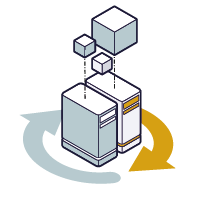Key concepts
Data mesh
Data Mesh is a decentralised data architecture where data is treated as a product and managed by specific data product owners.
This innovative architecture transfers data ownership responsibilities from a centralised data team to individual business units that generate and use data. The principles at the heart of Data Mesh include domain-driven design, product thinking, and federated governance.
Its four core principles are :

Domain Ownership
Each domain in a Data Mesh is accountable for its generated data, placing those with the most context in charge of data management.

Data as a Product
In this architecture, data is not just a by-product of business processes but a product in its own right. This perspective encourages treating data consumers as valued customers and providing a positive user experience.

Self-serve Data Infrastructure
A self-serve data infrastructure is crucial for domain teams to independently manage their data products end-to-end. This approach simplifies data product lifecycle management and promotes cross-domain collaboration.

Federated Governance
To avoid duplication of efforts, data silos, and lack of interoperability across data domains, a federated governance model is essential. This model establishes a shared language, including standards, terms, definitions, and policies, while allowing domain data owners to maintain autonomy.
In short, Data Mesh aims to create a seamless, user-friendly data experience while ensuring data accountability and facilitating inter-domain collaboration.
In line with these principles, Kindata empowers your organisation to harness the power of Data Mesh. We facilitate domain ownership, treat data as a product, and help establish federated governance. While Kindata itself is not a data platform, it is designed to be data platform agnostic, able to interact seamlessly with your existing infrastructure. Thus, it addresses three of the four core Data Mesh principles, setting the stage for maximising your data potential
